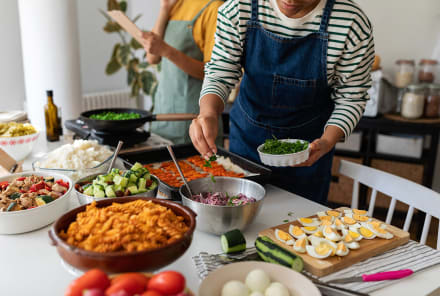Advertisement
10 Fun Facts About Sweet Potatoes


While kale is queen of the vegetable superfoods (how did you celebrate National Kale Day?), the sweet potato may be the most royal root at the Greenmarket. I love to load up on them as we transition into the cooler months, especially because they pair well with warming spices, like allspice and cinnamon.
Below are 10 things to know about these rockstar roots. Some of the information is from Deborah’s Madison’s latest, amazing book Vegetable Literacy, which I highly recommend if you're looking to navigate the differences between mustard and mizuna cabbage, or want suggestions with what to do with the rhubarb in your CSA (besides my default of just throwing it in the juicer).
1. Sweet potatoes and yams are not the same thing!
They're botanically two different vegetables, even though the supermarket may use them interchangeably.
2. Sweet potatoes make great kitchen décor on your counter.
No need to put sweet potatoes in your refrigerator! Madison advises you store them in a basket until ready to eat. Then you can "scrub them just before cooking and be sure to enjoy the skins.”
3. Sweet potato smoothies may be the perfect, energizing afternoon snack.
Add a healthy fat (I use almond butter, but avocado will also work), your favorite milk, ginger, and cinnamon to 1 cup of cubed sweet potatoes and 2 to 3 carrots. Blend. Add some of your favorite warming spices like nutmeg or allspice. Blend in some dates if you want more sweetness.
4. They deliver so much more than beta-carotene.
These orange-fleshed potatoes are known to be a great source of beta-carotene. But they also deliver good sources of “vitamin A, a good source of vitamin C, and are full of manganese, calcium, potassium, iron, vitamin B6 and fiber,” explains Madison.
Sounds good? It gets better: the sweet potato has a lower glycemic index than the potato.
5. They made the A-List.
Sweet Potatoes made the Clean 15, which means your potential exposure to toxins is lower than with other conventionally grown produce. (I still always try to buy organic when it’s an option.)
6. The jewel yam sweet potato is by far the most popular variety.
While the jewel represents more than 75% of the commercially grown options, there are other sweet potato options out there, including Garnet (also not a yam), Diana, and Beauregard. Some popular firm sweet potato varieties include Kotobuki, Hannah, Okinawan, Yellow Jersey, and Boniato. Madison writes that Kotobuki tastes more “like chestnuts than candy” (sign me up!) and Boniato is “the least sweet of the sweet potatoes.”
7. You can eat the whole plant.
Just as you'd never throw away a lemon without using the zest (or is that just me?), you can also enjoy more than just the tubers. Madison explains that you can eat the leaves, shoots and stems, which “are similar to Malabar spinach, very nutritious.”
Now to try to find tubers with the leaves, shoots, and stems….CSA?
8. Sweet potatoes play well with others.
They pair well with your existing pantry staples. Madison recommends everything from sesame oil, ginger, cardamom, chile, coconut mylk, cilantro, coriander, allspice, cinnamon, sesame seeds, lime, oranges, tangerines, maple syrup, smoked salt, white miso, rosemary and thyme.
9. Sweet potato wedge fries are a tasty take on truffle fries. (And way healthier than those “Satisfries!")
Here’s how I make mine:
One small sweet potato = 8 wedge fries
You can use as many as you like!
- Pre-heat the oven to 400 degrees.
- Brush a baking pan with some grapeseed oil.
- Wash and scrub the sweet potatoes.
- Cut the sweet potatoes in half.
- Repeat twice more so that you are left with around eight long wedges.
You can cut them once more if you want them a little thinner. Sprinkle with sea salt and roast in the oven for 25 minutes. Taste to make sure they are tender; remove from oven, and let cool. Then drizzle some organic truffle oil on each wedge. The Da Rosario organic truffle oil is a delicious, decadent splurge.
10. Sweet Potatoes + Chickpea miso may help with your digestion.
One of my favorite fermented foods is soy-free chickpea miso. Here’s my favorite way to prepare it.
- Cook 2 to 3 sweet potatoes for 20 to 25 minutes.
- Once the sweet potatos are tender, mash them together.
- To make the sauce, combine ¼ cup of olive oil, to 1 heaping tablespoon of chickpea miso, 1 tablespoon of white wine vinegar, juice of 1 lime (and its zest), and ½ an inch of grated ginger.
- Mix together to create a paste and then mix them into the smashed sweet potatoes. Add some of your favorite super foods like chopped cilantro or black sesame seeds for an extra superfood kick.
And if you want to learn more about sweet potatoes or other treats, Vegetable Literacy is the book for you. Check it out!











